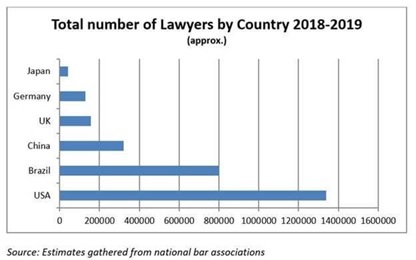ARTICLE
Understanding the Unique Japanese Legal Talent Market
Japan is a truly amazing country in which I have had the pleasure of working in for over 15 years. It is a true economic miracle to rise from the disastrous aftermath of WWII to become the third largest economy in the world despite a population of only 126m people. Japan is rightly lauded for its many great attributes such as a safe, ordered society; strong family unit; strong company loyalty; and a very strong work ethic. However, despite these many desirable qualities, Japan remains one of the most difficult markets in which to hire quality legal talent—but why is this?
As always, the question of why is never a straightforward one, and there are many contributing factors that make hiring a bilingual Bengoshi (Japanese lawyer) challenging:
- Extremely small talent pool – A long tradition of an ordered, non-litigious society has resulted in a limited need for large numbers of Japanese lawyers and has been reflected in one of the lowest lawyer pools amongst developed nations. Contributing to this lawyer shortage was a traditional pass rate of between 1–3% for the original Japanese bar exam, and while this has improved since the implementation of the new Japanese law school program, the pass rates are still low at between 20–25% (aggregate figure up to 2018). Despite a steady increase in the total number of Bengoshi, there exists today only a little over 43,000 Japanese Bengoshi.

- Language barriers – In many countries where there exists a shortage of domestic lawyers, the shortfall can often be supplemented by lawyers from outside jurisdictions, but given the great difficulties of learning the Japanese language, this is rarely possible. While it is often promoted that up to 25% of Japanese lawyers have bilingual capability, those whom possess a high degree of business fluency is closer to 5%. It should be noted that this truly bilingual pool of just 2,150 lawyers are spread across all ages groups, all areas of specialism and all geographical locations, meaning that when matching a particular skill set, location and experience level, the entire viable candidate pool may be as low as a few hundred lawyers.
- Historical graduate recruitment methods – Whilst the current reality is changing rapidly, many domestic companies in Japan had in the past traditionally favoured graduate recruitment and long-term employment (sometimes referred to as “job for life” system). This system impacted the pay structures of many domestic companies with salaries directly proportional to the years of service rather than skills or professional qualifications. This represented a barrier to entry for Bengoshi seeking in-house careers as their years of study and qualifications were often not reflected in the salary levels available. This fact coupled with the shortage of qualified lawyers meant that many legal teams were made up of non-qualified members. In recent years, many companies have begun taking steps to rectify this problem but it is a slow process. Whilst this continues to improve year after year, the perception of an in-house role as being poorly paid remains in the minds of many lawyers.
- Prestige and status – Lawyers enjoy a high degree of social status and respect in Japan. There are many ways to illustrate this but perhaps none so impressive as symbolized by the gold chrysanthemum lapel pin worn by every Bengoshi. This symbol is only worn by Bengoshi, Diet members and the Emperor of Japan. Likewise, the honorific title of “sensei” is used for very select well-respected professions such as teachers, doctors and lawyers. This special status naturally impacts in-house legal hiring where the company legal department may not carry the same prestige or recognition as the elevated role of external counsel at a law firm. As such, becoming just another member of a legal team comprised of qualified and non-qualified colleagues may impact the attractiveness of a role, especially where the reporting line may not be to another lawyer.
- Unfamiliarity with job change – Due to the job stability within the Japanese legal sector, it is not unusual to find lawyers of 10 years or more who have never changed jobs. Even amongst senior applicants, it is easy to find individuals who have never made a CV, conducted a job interview or used a recruiter. While this can be largely overcome with coaching from a consultant, it does mean that delays or indecision may arise due to inexperience.
With all of these difficulties associated with the Japanese market, it may be easy to be dissuaded from hiring lawyers in Japan. But given the importance of the market and the integral nature of Japan coverage to the Asia region, how then can a company overcome the above challenges effectively and secure a long-term superstar of their own? The secret is to ensure you:
- Plan early for your hire to gather as much information as possible before you start.
- Know the market, and tailor the package and position structure accordingly.
- Partner with the right agencies who have the relevant expertise, knowledge and skills.
- Avoid any contingency search for senior lawyers where message, method, screening and outreach become diluted and chaotic.
- Ensure a fast, streamlined interview and hiring process to avoid losing candidates in a highly competitive market.
- Be flexible. You may not be able to get everything on your wish list, so prioritize the “must have” from the “nice to have” and assess development potential for any areas lacking.
